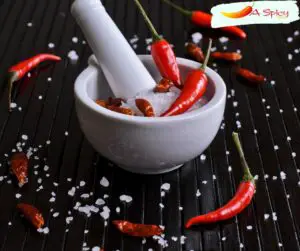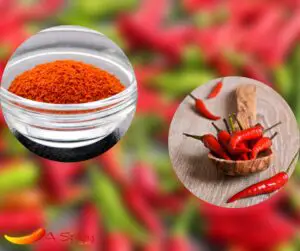
Cayenne pepper can be a great addition to your diet. It has been used for centuries as a natural remedy and is known to have many health benefits. Cayenne pepper has been shown to help decrease pain and inflammation in the body, including arthritis and headaches.
However, there is a lingering question that many keep asking; does cayenne pepper irritate the bladder?
Yes, it can. Cayenne pepper contains capsaicin, a compound that can irritate the bladder. Those with sensitive bladders may want to avoid this spice altogether due to its potential irritation effects on the bladder.
What Makes Cayenne Pepper A Bladder Irritant?
Capsaicin, a compound found in cayenne and chili peppers, irritates the bladder. Capsaicin is used as an analgesic to relieve pain because it causes your body to release pain-killing endorphins. However, capsaicin can also cause bladder inflammation and irritation due to its ability to irritate nerve endings in the body.

The capsaicin in cayenne pepper stimulates sensors in your mouth that send nerve signals to your brain, which then sends messages throughout your body, including the bladder. At high doses, capsaicin will irritate any tissue it comes into contact with; this includes mucus membranes such as those found inside the nose or mouth or a person’s bladder.
This irritation causes more frequent urination and burning sensations during urination due to increased blood flow near where urine exits from the urethra.
Other Causes of Bladder Irritation
Bladder irritation is a condition that causes pain in the bladder. And while cayenne pepper can aggravate existing bladder problems, it’s essential to understand that not all bladder irritations are the same.
If you experience any of these symptoms of bladder irritation: frequent urination, painful urination; or blood in the urine; see a doctor immediately so they can rule out any underlying medical conditions. That said, there are several causes for bladder irritation, including:
Allergies
If you’re allergic to cayenne pepper or any other food, you may experience bladder irritation. Food allergies are common and often caused by pollen or dust that comes into contact with the body through inhalation or swallowing. The immune system then recognizes these substances as foreign invaders and creates antibodies against them. These antibodies cause an allergic reaction when they come in contact with that allergen.
Trauma
Trauma, which occurs when your body is stressed or injured can cause bladder irritation. Some common causes of bladder trauma include:
- Falling
- Heavy lifting or activity for long periods that are not physically demanding
- Childbirth (known as pelvic floor dysfunction)
In addition to these types of injuries, there are many other ways in which trauma may occur to the bladder. One example is surgery that involves cutting into the abdomen and pelvis to repair internal organs or tissues.
In some cases, this type of procedure can cause damage to nerves that carry signals from the brain to control urination; another common side effect associated with surgical procedures like these is nerve damage in general.
Medical Conditions
If you have a medical condition such as interstitial cystitis, chronic prostatitis, bladder cancer, bladder stones, or spasms and have been experiencing bladder irritation after consuming cayenne pepper. You should contact your healthcare provider about this new symptom.
A few more causes of discomfort in the urinary tract are urinary tract infections (UTIs), overactive bladder syndrome, and irritable bowel syndrome with irritable bowel-type symptoms (IBS-IBD).
Certain Chemicals
Chemicals are substances composed of atoms that form bonds with other atoms. They’re found just about everywhere in our environment. Chemicals are in food, water, and air; they’re in cleaning and personal care products; they’re even used in pesticides.
Most chemicals don’t cause any harm when consumed or applied to your skin. However, some substances can be harmful depending on who is exposed to them and at what levels. And this increases the likely hood of you getting bladder irritation if you ingest a chemical that is not bladder friendly.
How to Calm an Irritated Bladder
Thankfully, there are a couple of ways you can calm an irritated bladder. However, if your discomfort is more severe, you should consult your doctor or physical therapist for additional treatment. For mild irritations, here is a list of what you can do:
Drinking Plenty of Fluids
One of the best ways to help flush out the irritant is by drinking plenty of fluids. Like most things, too much liquid can be detrimental and lead to increased urination. However, drinking enough water should help prevent dehydration and help reduce inflammation in your bladder.
Using Over-The-Counter Pain Medication
Over-the-counter pain medication is an excellent way to get relief. You can take acetaminophen (Tylenol) or ibuprofen (Motrin or Advil) medications, which are safe for your bladder. These work by reducing inflammation in the bladder and relieving muscle aches and pains.
Using a Heating Pad
If you need relief from bladder pain, try using a heating pad. The goal is to apply the pad for about 20 minutes. However, ensure that the heating pad is not too hot, and you should be able to touch it comfortably without burning yourself.
This method can help soothe pain and cramping caused by bladder irritation, cystitis, or interstitial cystitis. However, it’s best used with other treatments like fluids and rest.
Practice Stress Relief Techniques
Another way to help reduce bladder irritation is to practice stress relief techniques. Stress can significantly contribute to many people who experience urinary incontinence, overactive bladder, or painful urination. The following are some of the most common stress relief methods:
- Relaxation techniques: Some examples include meditation and yoga, which have been shown to help reduce anxiety and depression. Other relaxation methods include breathing exercises, massage, or acupressure. When practiced regularly, these activities can help calm your mind so that you feel less stressed.
- Therapy: While therapy won’t address your bladder health directly, it could help provide counseling or treatment options should other symptoms arise later on down the road.
Avoiding Foods and Drinks that Can Irritate the Bladder
Avoiding caffeine, alcohol, and spicy foods is a good idea for those with bladder irritability. Caffeine can increase urination in those who drink it and cause an increase in the frequency of urination. Alcohol may also increase the number of times you have to pee and make your bladder more sensitive to irritation from other stimuli.
Spicy foods like cayenne pepper are healthy for most people but could irritate your bladder because they are high in spice. Foods that are high on the salt or sugar scale should also be avoided if you want to keep your bladder calm.
Conclusion
No doubt, adding some cayenne pepper to your meal can help you spice it up and infuse some hotness. However, it can irritate the bladder, just as many other foods and beverages cause similar symptoms. It’s best to consult a doctor if your symptoms persist after following the tips above for managing them.







